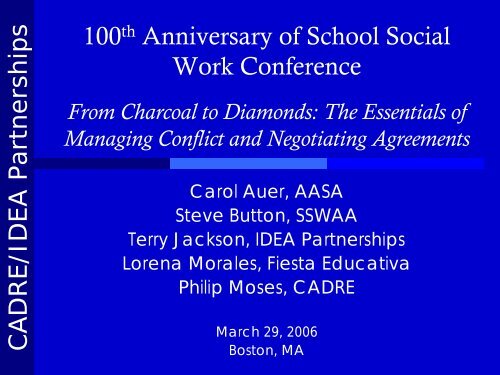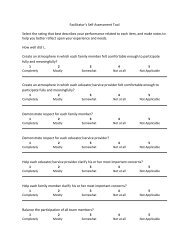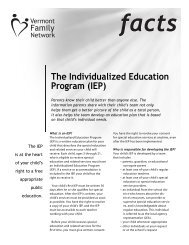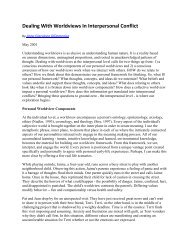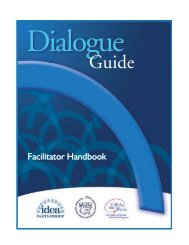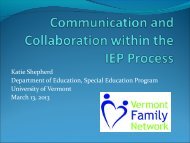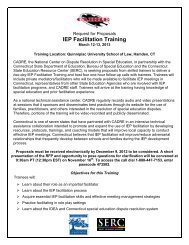The Five Conflict Handling Modes - Direction Service
The Five Conflict Handling Modes - Direction Service
The Five Conflict Handling Modes - Direction Service
Create successful ePaper yourself
Turn your PDF publications into a flip-book with our unique Google optimized e-Paper software.
CADRE/IDEA Partnerships<br />
100 th Anniversary of School Social<br />
Work Conference<br />
From Charcoal to Diamonds: <strong>The</strong> Essentials of<br />
Managing <strong>Conflict</strong> and Negotiating Agreements<br />
Carol Auer, AASA<br />
Steve Button, SSWAA<br />
Terry Jackson, IDEA Partnerships<br />
Lorena Morales, Fiesta Educativa<br />
Philip Moses, CADRE<br />
March 29, 2006<br />
Boston, MA
CADRE/IDEA Partnerships<br />
Coal, Graphite or Diamonds?<br />
Let’s find out…<br />
Thomas-Kilmann <strong>Conflict</strong> Mode<br />
Assessment Instrument
CADRE/IDEA Partnerships<br />
<strong>The</strong> <strong>Five</strong> <strong>Conflict</strong> <strong>Handling</strong> <strong>Modes</strong><br />
Personal Goals<br />
Controlling<br />
Collaborating<br />
Compromising<br />
Avoiding<br />
Accommodating<br />
Relationship Goals<br />
Source: Thomas- Kilmann <strong>Conflict</strong> Mode Instrument
CADRE/IDEA Partnerships<br />
Personal Goals<br />
Avoiding<br />
• Unassertive and uncooperative<br />
• Do not pursue your own<br />
concerns or those of other(s)<br />
• Don’t address the conflict<br />
• Sidestep, postpone, or withdraw<br />
from the issue for the present<br />
time<br />
Relationship Goals
CADRE/IDEA Partnerships<br />
Personal Goals<br />
Avoiding – When to Use<br />
• When the potential danger or<br />
damage outweighs the benefits<br />
of resolution<br />
• When more time is needed to<br />
collect information<br />
• When emotions need to cool<br />
down<br />
Relationship Goals
CADRE/IDEA Partnerships<br />
Personal Goals<br />
Accommodating<br />
• Focuses on relationship needs<br />
• Sacrifice your own personal<br />
goals to satisfy the concerns of<br />
the other(s)<br />
• Yield to another point of view<br />
Relationship Goals
CADRE/IDEA Partnerships<br />
Personal Goals<br />
Accommodating – When to Use<br />
• To preserve harmony and avoid<br />
disruption<br />
• To achieve temporary settlement<br />
• To arrive at quick solutions under<br />
pressure<br />
• When the relationship is the most<br />
important goal<br />
Relationship Goals
CADRE/IDEA Partnerships<br />
Personal Goals<br />
Controlling<br />
• Power oriented<br />
• Pursue own ends without<br />
agreement of others<br />
• Achieving one’s personal goals<br />
paramount<br />
• Results in win-lose or lose-win<br />
Relationship Goals
CADRE/IDEA Partnerships<br />
Personal Goals<br />
Controlling – When to Use<br />
• In emergencies<br />
• When unpopular actions must be<br />
implemented<br />
• When your family or organization’s<br />
welfare is at stake<br />
• When your authority and<br />
responsibility are unquestionable<br />
Relationship Goals
CADRE/IDEA Partnerships<br />
Personal Goals<br />
Compromising<br />
• Objective to find expedient,<br />
mutually acceptable alternative<br />
• Both parties give up something<br />
• Exchanging concessions –<br />
splitting the difference<br />
• Quick middle position<br />
Relationship Goals
CADRE/IDEA Partnerships<br />
Compromising – When to Use<br />
Personal Goals<br />
• When two parties of equal power are<br />
strongly committed to mutually<br />
exclusive goals<br />
• To achieve temporary settlements to<br />
complex issues<br />
• To arrive at quick solutions under<br />
pressure<br />
• When the goals of each party are of<br />
moderate importance and<br />
collaboration isn’t worth the time<br />
required<br />
Relationship Goals
CADRE/IDEA Partnerships<br />
Personal Goals<br />
Collaborating<br />
• Personal goals and relationship goals are<br />
of equal importance/value<br />
• Seeks win-win outcomes using advanced<br />
skills and strategies<br />
• Want to find a solution that fully satisfies<br />
needs and concerns of both people<br />
• Involves time commitment in identifying<br />
concerns of each person and finding<br />
alternatives that meet both sets of needs<br />
Relationship Goals
CADRE/IDEA Partnerships<br />
Personal Goals<br />
Collaborating – When to Use<br />
• When both the issues at hand and the<br />
relationship are important<br />
• When the parties are relatively equal in status<br />
and power – or the more equal or powerful<br />
party supports a win-win collaborative solution<br />
• When the parties are inter-dependent upon<br />
one another to implement the solution<br />
• When both sets of goals are too important to<br />
compromise<br />
• You have enough time and are willing to take<br />
the time necessary<br />
• When the quality of the decision is critical<br />
• To gain commitment and acceptance<br />
through consensus<br />
Relationship Goals
CADRE/IDEA Partnerships<br />
<strong>The</strong> <strong>Five</strong> <strong>Conflict</strong> <strong>Handling</strong> <strong>Modes</strong><br />
Personal Goals<br />
Controlling<br />
Collaborating<br />
Compromising<br />
Avoiding<br />
Accommodating<br />
Relationship Goals<br />
Source: Thomas-Kilmann <strong>Conflict</strong> Mode Instrument
Listening<br />
CADRE/IDEA Partnerships
CADRE/IDEA Partnerships<br />
“Listening is probably the most<br />
cost effective element of a<br />
conflict management system.”<br />
Mary Rowe
CADRE/IDEA Partnerships<br />
Characteristics of Good Listening<br />
Think of a time when someone listened<br />
to you.<br />
What did he/she do that made you<br />
feel he/she was listening?<br />
What was his/her attitude toward you?
CADRE/IDEA Partnerships<br />
Listening<br />
Following the thoughts and feelings of<br />
others to understand what they are<br />
saying from their perspective, frame of<br />
reference, or point of view.<br />
Dignity and Respect
CADRE/IDEA Partnerships<br />
<strong>The</strong> Chinese characters that make<br />
up the verb “to listen” tell us<br />
something about this skill.
CADRE/IDEA Partnerships<br />
Listening Problem Solving<br />
Sometimes speakers just need to be<br />
heard<br />
Sometimes listening clears up confusion<br />
Sometimes listening identifies a need for<br />
problem solving
CADRE/IDEA Partnerships<br />
Reflective Listening<br />
<strong>The</strong> HEART of listening is:<br />
EMPATHY, CARING & RESPECT<br />
Main rule:<br />
KEEP THE FOCUS ON THE OTHER
CADRE/IDEA Partnerships<br />
<strong>The</strong> Three Basic Skill Clusters for<br />
Reflective Listening Are:<br />
Attending Skills<br />
Following Skills<br />
Responding Skills
CADRE/IDEA Partnerships<br />
Attending Skills:<br />
Posture<br />
Contact (distance, eyes, touch)<br />
Gestures<br />
Environment<br />
Interested Silence
CADRE/IDEA Partnerships<br />
Following Skills<br />
Door-Openers<br />
Acknowledgement Responses<br />
Open-Ended Questions
CADRE/IDEA Partnerships<br />
Responding Skills<br />
Reflecting Content<br />
Reflecting Feeling<br />
Reflecting Meaning<br />
(Content linked with feeling)<br />
Summarizing
CADRE/IDEA Partnerships<br />
Certain Responses …<br />
Derail the conversation<br />
Take the focus off the other<br />
Block the other from finding a solution<br />
Lower the other’s self-esteem<br />
Distance your self from the other<br />
Diminish the other’s motivation
CADRE/IDEA Partnerships<br />
High Risk Responses<br />
Sending Solutions<br />
Ordering<br />
Threatening<br />
Moralizing<br />
Advising<br />
Logically Arguing<br />
Questioning<br />
Evaluating Withdrawing<br />
Judging Reassuring<br />
Praising Diverting<br />
Diagnosing<br />
Name-Calling<br />
Takes the focus off the other person
CADRE/IDEA Partnerships<br />
Listening is a disciplined skill<br />
You can’t do two things at<br />
once if one of them is<br />
listening.
Positions & Interests<br />
CADRE/IDEA Partnerships
CADRE/IDEA Partnerships<br />
Positions & Interests<br />
Position<br />
Specific solution proposed to resolve problem - the<br />
“WHAT”<br />
Interest<br />
Underlying real need/desire that gives position its life<br />
(i.e., beliefs, expectations, values, fears, priorities,<br />
hopes, concerns) – the “WHY”
CADRE/IDEA Partnerships<br />
Three Kinds of Interests<br />
Substantive<br />
Psychological<br />
Procedural
CADRE/IDEA Partnerships<br />
Sample Positions:<br />
“<strong>The</strong> target level for appropriate<br />
interactions in my classroom must remain<br />
at 50%.”<br />
“We want an ASL interpreter in that<br />
English Lit class.”<br />
“I demand an apology now!”<br />
“Rob has a right to a full time instructional<br />
assistant next term”
CADRE/IDEA Partnerships<br />
Position:<br />
Issue:<br />
Interest:<br />
Stage 1<br />
Stage 2<br />
Stage 3<br />
Stage 4<br />
Finding the Interests<br />
Position A<br />
Issues<br />
Interests and positive<br />
intentions<br />
Options for<br />
agreement<br />
One party’s solution to the problem/ situation.<br />
Often a self-serving solution<br />
Common<br />
ground<br />
Position B<br />
Issues<br />
Interests and positive<br />
intentions<br />
Elements or subject matter of the problem.<br />
Elements at issue between the parties that must be negotiated in order to reach agreement.<br />
Factors that motivate/ drive parties to reach agreement and take positions<br />
Interests underlie positions in that the parties’ positions are intended to meet and or address their interests<br />
(hopes, wants, needs, fears, concerns)<br />
Adapted from Highnam, K. (2001). Interest-based negotiation,<br />
CSSEA 2001 Fall Conference and AGM. Surry B.C, Canada. CSSEA.<br />
Options for<br />
agreement
CADRE/IDEA Partnerships<br />
Finding the Interests<br />
Question, question, question…<br />
"Why is that solution so important for you?“<br />
Why are you suggesting…?<br />
"What would you accomplish in getting what<br />
you want?"<br />
"What if that did/didn't happen?”<br />
“How will you be affected by…?”<br />
“Imagine that you got ___________; what would<br />
be taken care of?”
CADRE/IDEA Partnerships<br />
Finding the Interests<br />
What need is the person taking this<br />
position attempting to satisfy?<br />
What is motivating the person?<br />
What is the person trying to accomplish?<br />
What is the person afraid will happen if a<br />
demand is not fulfilled?
CADRE/IDEA Partnerships<br />
<br />
<br />
<br />
<br />
<br />
<br />
<br />
<br />
Summary: Interest-based Negotiation<br />
Aims not to change the other person, but to change negotiation<br />
behavior<br />
Separates the people from the problem<br />
Soft on people, hard on problem<br />
Shifts from ”your position versus mine” to “you and I versus the<br />
problem”<br />
Shifts from “position-taking” to “perspective-taking”<br />
Holds that Interests are a truer measure of negotiation goals than<br />
Positions.<br />
Involves a mutual exploration of interests to yield more creative<br />
options.<br />
Uses objective criteria<br />
Adapted from Highnam, K. (2001). Interest-based negotiation,<br />
CSSEA 2001 Fall Conference and AGM. Surry B.C, Canada. CSSEA; Fisher and Ury, Getting to Yes.
CADRE/IDEA Partnerships<br />
Facilitating IEP<br />
Meetings
CADRE/IDEA Partnerships<br />
Communication<br />
Approaches to Facilitation<br />
Goal of the Process<br />
Issue Identification<br />
Relational Transformation<br />
Settlement
CADRE/IDEA Partnerships<br />
Approaches to Facilitation<br />
Criteria for Decision - Making<br />
Interests<br />
Cost – Benefit, Etc.<br />
Power<br />
Rights
CADRE/IDEA Partnerships<br />
Facilitator<br />
Approaches to Facilitation<br />
Goal of the Process<br />
Transformation<br />
Evaluator
CADRE/IDEA Partnerships<br />
Participation:<br />
Meeting Functions<br />
Contributing information, ideas and<br />
suggestions<br />
Discussing the issues, asking questions and<br />
advocating<br />
Process Management:<br />
Setting and following an agenda<br />
Process agreements<br />
Keeping people focused on the task<br />
Encouraging participation<br />
Adapted from JDL & Associates
CADRE/IDEA Partnerships<br />
Meeting Functions<br />
Information Management:<br />
Organizing and recording information<br />
Documenting agreements appropriately<br />
Decision Making:<br />
Clarifying options<br />
Analyzing possible solutions<br />
Making decisions by consensus<br />
Adapted from JDL & Associates
CADRE/IDEA Partnerships<br />
Some Prevention Activities<br />
At the beginning:<br />
Getting agreement on outcomes, agenda, roles,<br />
decision-making (consensus), ground rules<br />
During the meeting:<br />
Making process suggestions<br />
Getting process agreements<br />
Clarify information through listening<br />
Providing feedback<br />
Elicit interests<br />
Generating participation<br />
Managing conflict<br />
Adapted from JDL & Associates
CADRE/IDEA Partnerships<br />
TESTED TIPS FOR IEP MEETINGS:<br />
What IEP Conveners Can Do (Pre-Meeting)<br />
Explain crucial nature of each team member’s<br />
involvement and what will happen at the meeting<br />
Schedule convenient time and location, and ample<br />
time for meeting<br />
Invite team members to review relevant documents<br />
prior to meeting and observe student
CADRE/IDEA Partnerships<br />
TESTED TIPS FOR IEP MEETINGS:<br />
What IEP Conveners Can Do (During Meeting)<br />
Make team members feel welcome<br />
Greet at door<br />
Perhaps a cold or hot beverage?<br />
Same size chairs for everyone<br />
Brief pre-meeting chit-chat and acclimatization<br />
Everyone introduce themselves and explain why<br />
they are there<br />
Everyone be addressed with the same degree of<br />
formality<br />
Speak in clear, plain language – avoid jargon and<br />
discipline-specific terminology<br />
Have copies of specific materials available that are<br />
referred to
CADRE/IDEA Partnerships<br />
TESTED TIPS FOR IEP MEETINGS:<br />
What IEP Conveners Can Do (During Meeting)<br />
Focus on the child’s individualized needs – not<br />
the program, classroom, or resource limitations<br />
Listen carefully<br />
Maintain confidentiality – don’t discuss other<br />
students<br />
Don’t hurry<br />
Be willing to say “I don’t know”<br />
Involve student for at least a portion of the<br />
meeting if they can contribute and always if 18<br />
or over
CADRE/IDEA Partnerships<br />
TESTED TIPS FOR IEP MEETINGS:<br />
What IEP Conveners Can Do (Post-Meeting)<br />
Review and evaluate<br />
What worked<br />
What didn’t<br />
Incorporate improvements into future<br />
meetings<br />
Consider building meeting tip file for each<br />
child – sources of anger, joy etc.<br />
Send home thank you note
CADRE/IDEA Partnerships<br />
For more information, contact<br />
CADRE, the National Center on Dispute<br />
Resolution in Special Education<br />
www.directionservice.org/cadre<br />
~&~<br />
<strong>The</strong> IDEA Partnerships<br />
www.ideapartnership.org


